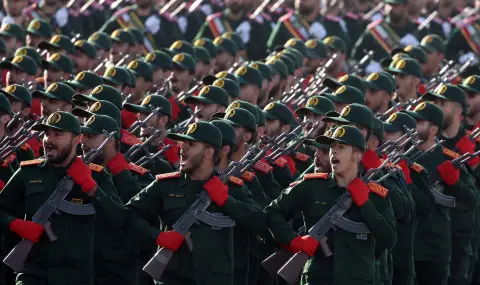The Iranian-created "Axis of Resistance" in the Middle East, with paramilitary groups attacking Israel, is bending under the blows of Israeli forces, Western media write after the latest events in Lebanon.
Shortly before the anniversary of the beginning of the conflict between Israel and the radical Palestinian group "Hamas" – one of Tehran's proxy organizations, which unexpectedly invaded Israeli territory on October 7, 2023, in massive strikes in Beirut, the leader of what was defined as the largest paramilitary force in the "axis" the Lebanese Shia movement "Hezbollah", Hassan Nasrallah, and the head of the wing of "Hamas" in Lebanon, Fatah Sharif Abu al-Amin and commanders of the Popular Front for the Liberation of Palestine. Israel launched a ground military operation in Lebanon last night, also attacking sites in the Syrian capital Damascus.
Faced with a major test, the Iranian "Axis of Resistance" is falling apart, write Alyssa Rubin and Ben Hubbard in the American New York Times, and another edition in the US – "Washington Post" notes that Israel is applying extreme force measures against the unification of groups in the Gaza Strip, Lebanon, Syria and Yemen.
The pro-Iranian alliance is under scrutiny after the latest Israeli strikes in Lebanon, according to the "New York Times". "The idea was simple: when war broke out with Israel, all members of the Iranian-backed militia network in the Middle East, known as the "Axis of Resistance,", joined the battle with coordinated actions subordinated to the common goal – destruction of the Jewish state", write Rubin and Hubbard.
Iran mapped out the strategy and invested enormous resources to build the fighting capacity of each of the proxy groups and network them, the authors continue, while stressing that the response of the "Axis" after the Israeli strikes on "Hezbollah" he had been weak in recent weeks. This according to the "New York Times" suggests that the network is "weaker and more fragmented than many in the region had expected, and there are fears in Iran that an escalation of the conflict would direct Israeli firepower towards Tehran.
"Hamas" is too weakened after almost a year of war with Israel in the Gaza Strip to do anything, the authors in the American publication believe. The Houthis in Yemen and paramilitary groups in Syria and Iraq have launched attacks on Israel or US military bases in the Middle East, but they have been largely repulsed, and Syria – the only country that is a member of the "axis" apart from Iran - has refrained from actions along the border with Israel, Rubin and Hubbart note.
"The New York Times" points out that Nasrallah, who headed the ``Hezbollah'' created with the direct participation of Iran in the early 1980s, was the mainstay of the ``Axis of Resistance''. Because of its long history and close ties with Iran, where many of its commanders have received training, the group has better tactical combat skills than other organizations and an advantage in its weaponry, which includes guided missiles, the newspaper noted. Therefore, the death of the leader could be a crushing blow to the Middle East alliance against Israel, summarizes the American publication.
"Israel hit the Axis of Resistance like a hammer, created chaos in Hezbollah. and decapitated its leadership", writes Ishaan Tharoor in this spirit in the "Washington Post", adding that "the question remains open as to how Iran will react".
The ground military campaign that is planned by Israel in Lebanon is smaller in scale than the last Israeli war against "Hezbollah" in 2006 and will focus on clearing the group's fighting infrastructure along the border to eliminate the threat to border residents, the Washington Post said. Indicative of Israel's intentions for decisive action, however, are the strikes in the center of Beirut – the first in this territory since the beginning of the conflict with "Hamas" in Gaza, the publication states.
Another American newspaper – "Wall Street Journal", emphasizes the fact that the murdered leader of the Lebanese wing of "Hamas" Fatah Sharif Abu al-Amin was a "senior official" of the United Nations Relief and Works Agency for Palestine Refugees. This, according to the publication, is likely to increase suspicions about the influence of the radical Palestinian group in the humanitarian organization.
The agency itself announced that the liquidated commander worked for it as a school principal and also headed a union representing thousands of teachers, notes the "Wall Street Journal", while at the same time stating that the "Western-funded organization providing life-saving aid to the population of the Gaza Strip has long struggled to defend its neutrality vis-à-vis extremist groups.
The analyst on diplomatic issues of the British "Guardian" Patrick Winter states in the title of his material that "the decapitation of "Hezbollah" puts possible actions on the scales of Iran". According to Winter, Iranian President Massoud Pezeshkian "is under pressure at home, with world observers pointing to the high risk of a direct Iranian attack on Israel".
"The Iranian government has announced that it does not plan to send to "Hezbollah" in Lebanon military reinforcements, but is under internal pressure from hardliners who seek to use the situation, interpreted by them as a retreat in opposition to Israel, and to block any discussions with the West about future oversight of Iran's nuclear program, it says in the "Guardian" analysis.
Calls for a tougher response from Iran have redoubled as it emerged that Brigadier General Abbas Nilforoushan, deputy commander of the Islamic Revolutionary Guard Corps (IRGC) for Lebanon and Syria, had been killed in Beirut along with Nasrallah, Winter continues. However, the dominant line in Iran's ruling circles remains that a direct war with Israel should be avoided, as this would put a trump card in the hands of Israeli Prime Minister Benjamin Netanyahu and draw the US directly into the conflict, but "Hezbollah" should not be left alone, concludes the "Guardian" in its analysis.
